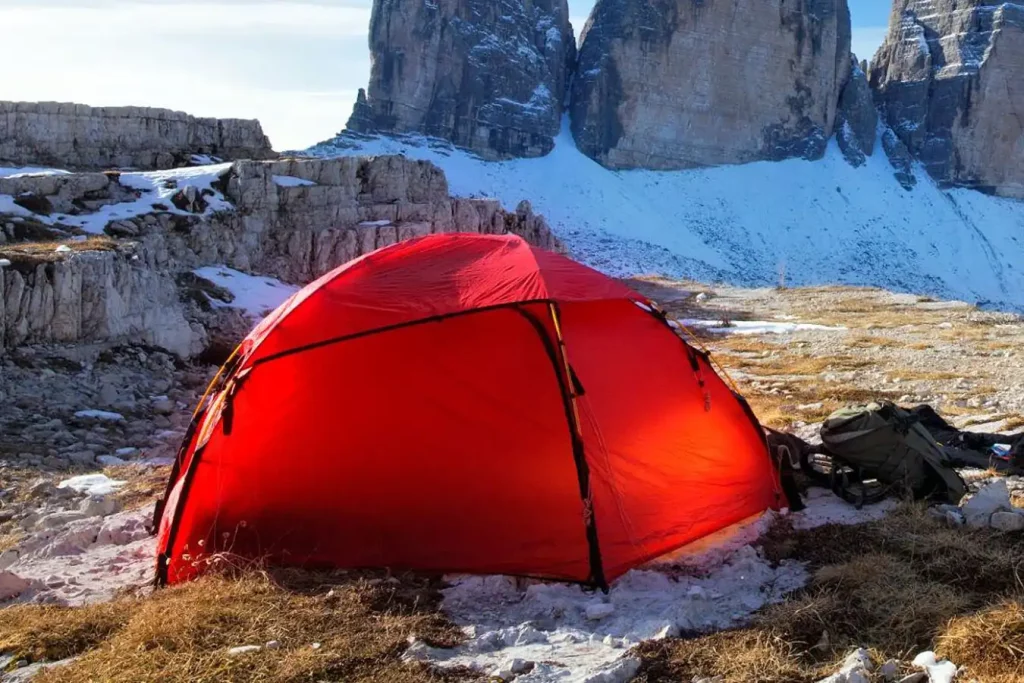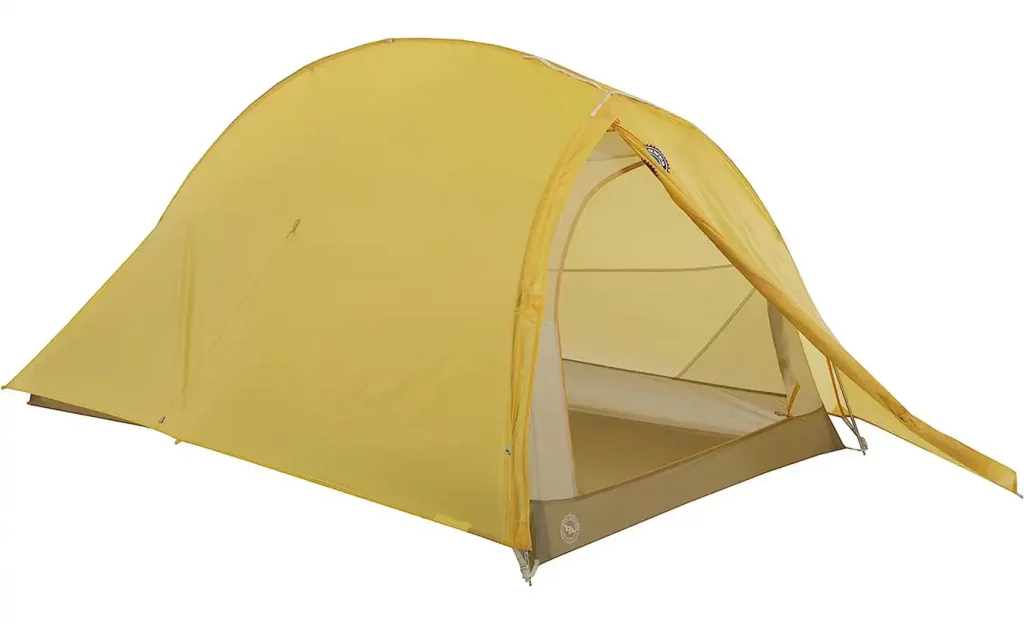Ever thought, “how much should a backpacking tent weigh?” while staring at a mountain of camping gear?
We get it – trekking with heavy gear is a pain, literally.
Packing light feels awesome, but no one wants a flimsy tent.
Finding that sweet spot between weight and quality? It's tricky.
In this guide, we're diving deep into the world of tents and weights.
So, kick back, and let's chat about making your next hike a breeze.
The Importance of Tent Weight in Backpacking
The Role of a Tent in a Backpacking Trip
Think of your tent as your shield – it protects you from the elements, insects, and gives you a private space in the wilderness. Its essence goes beyond mere shelter; it also impacts your mobility, ease of carrying your backpack, and energy conservation. Therefore, the choice of tent – especially its weight – becomes a game-changer.

How Tent Weight Affects the Backpacking Experience
Weight plays a critical role in a backpacking trip. Every extra ounce can feel like a pound after a long day of trekking. A heavier tent can lead to fatigue, slower pace, and may even compromise your ability to reach your destination. So, it’s worth putting in the time and effort to choose a tent that matches your needs without breaking your back.
Why Lightweight Tents are Preferred
Lightweight tents, usually weighing around 2 to 3 pounds, are preferred by backpackers for their convenience. They are easier to pack and carry, reducing strain on your back and shoulders. They also offer quicker setup and takedown, making them ideal for hikers who wish to cover more ground or frequently change campsites.
Factors Influencing Backpacking Tent Weight
Tent Size and Capacity
Tent size directly impacts its weight. Naturally, a 2-person tent will weigh less than a 4-person tent. Consider your needs – are you a solo traveler who values extra space, or a couple that doesn't mind getting cozy? Picking a tent with just the right capacity can save unnecessary weight.
Tent Design and Structure
Tent weight also depends on its design. Dome tents, for instance, are sturdy and resistant to wind but tend to be slightly heavier. On the other hand, tunnel tents are lighter but may not fare well in windy conditions. Balance your weight priorities with the expected weather on your trail.
Tent Poles and Materials
The type of tent poles and the materials used for the tent fabric significantly affect its weight. Aluminum poles are light and durable, while carbon fiber poles are even lighter but costlier. Similarly, nylon and polyester tents are light and reasonably durable but might not be as sturdy as heavier canvas tents.
Rainfly and Vestibule Considerations
Extra features like a rainfly or a vestibule provide added protection and storage space, but they add weight. Consider your destination's weather. If you expect frequent rain or snow, the added weight of a rainfly would be beneficial.
Zippers, Stakes, and Guy Lines
It's surprising how little elements like zippers, stakes, and guy lines can influence tent weight. Going for lighter, yet durable options or minimizing the number of these accessories can help reduce your pack weight.
Added Features and Accessories
Additional features like interior pockets, lantern hooks, or gear lofts can make your camping experience more comfortable. However, they do contribute to the overall weight. Scrutinize each feature to decide if its utility on the trail outweighs its additional weight.
Ideal Weight Range for Backpacking Tents
Wondering about how much should a backpacking tent weigh! Take a break and watch
What is the Typical Weight Range for Backpacking Tents
Most backpacking tents on the market fall within a weight range of 2 to 5 pounds. This range ensures a blend of comfort, durability, and ease of transport. However, there are extreme options available as well, such as ultralight tents weighing less than 2 pounds or more sturdy, feature-rich tents exceeding 5 pounds.

Lightweight vs Ultra-lightweight Tents: Pros and Cons
Lightweight tents, typically around 2 to 3 pounds, balance between comfort and weight. They offer decent living space, durability, and weather protection without being overly heavy.
In contrast, ultra-lightweight tents weigh less than 2 pounds, favoring mobility and speed. They often achieve this by sacrificing space, durability, or weather resistance. Some ultra-lightweight tents may not include a floor or use single-wall construction to reduce weight.
Expert Opinions on Ideal Backpacking Tent Weight
While the ideal tent weight is a matter of personal preference, many experts suggest sticking to the 2 to 3-pound range for most backpackers. This range typically provides a good balance between comfort, durability, and weight.
In short, a backpacking tent should ideally weigh between 2 to 3 pounds per person to balance both the need for comfort and the necessity of carrying a light load on the trail.
Read more: How Much Does a Tent Weigh
How to Choose the Right Tent for Your Backpacking Trip
Assessing Your Specific Needs and Constraints
Identify the purpose of your trip: Are you going for a weekend hike or a multi-day excursion? What's the weather like? Will you camp at the same site every night or move frequently? Your specific needs and trip constraints will influence the ideal weight of your tent.
Factors to Consider Besides Weight: Durability, Weather Resistance, etc.
While weight is a key factor, don't overlook durability and weather resistance. A super-light tent might be less resilient or lack in protection against harsh weather. Opt for tents made from robust materials and with sturdy construction if you expect demanding conditions.
Balancing Weight and Comfort: A Personalized Approach
Striking a balance between weight and comfort is crucial. You may prefer a heavier, more comfortable tent if you're hiking shorter distances, while a lighter tent could be ideal for long treks. Consider your physical condition, the terrain, and your hiking style to find your perfect match.
Also learn: How Much Should a Backpack Weigh
Minimizing Tent Weight: Tips and Tricks
Ultralight Backpacking Techniques
Ultralight backpacking is a practice of minimizing pack weight as much as possible, and this extends to your tent. Opting for a tarp tent, bivy sack, or hammock can drastically reduce weight. Some backpackers even choose to share tents to split the load.
Lightweight Gear Options
Consider lightweight gear options. Aluminum or carbon fiber poles, siliconized nylon fabric, and minimalist designs can shave ounces off your tent weight.
Space-Saving Techniques Without Compromising Comfort
Maximize the utilization of your tent's space. For example, store your gear in vestibules or hang items using internal loops. This way, you can opt for a smaller, lighter tent without sacrificing comfort.
Best Practices for Reducing Tent Weight
Efficient Gear Selection
Choosing your gear efficiently can significantly help reduce tent weight. For instance, you could opt for a tent with lighter materials or a design that does away with unnecessary features. For shorter trips, consider if you can do without certain luxuries. Remember, every ounce adds up.
Evaluating Multi-functional Gear Options
Multi-functional gear can be a game-changer. For instance, consider trekking poles that double as tent poles, or a poncho that can be used as a makeshift shelter. By opting for such gear, you can serve multiple needs with a single item, saving weight and space in your backpack.
Planning and Organizing for Weight Reduction
Planning and organization are crucial for weight reduction. Pack only what you need, taking into account the length of your trip and expected weather conditions. A systematic approach to packing can prevent unnecessary items from adding weight to your load.
Product Examples and Tent Reviews
Lightweight Tent Options in the Market
A variety of lightweight tents are available on the market. For instance, the Big Agnes Fly Creek HV UL2 (Amazon) weighs only 2.2 pounds, making it a great option for weight-conscious backpackers. The MSR Hubba Hubba NX (Amazon), weighing 3.4 pounds, is another favorite among backpackers for its balance between comfort and weight.

Reviews and Recommendations of Specific Tent Models
The Big Agnes Fly Creek HV UL2 (Amazon) is known for its ultra-lightweight design and spacious interior. It's highly recommended for those prioritizing weight reduction. On the other hand, the MSR Hubba Hubba NX2 (Amazon), though a bit heavier, offers excellent durability and weather resistance. It's well-loved for its reliability and comfort.
Comparing Tent Weights: A Practical Guide
When comparing tent weights, remember to check whether the listed weight includes all components such as stakes, guylines, and a footprint. Some manufacturers list a lower “minimum trail weight” that only includes the tent body, rainfly, and poles.
Know more: How Much Does a Camper Trailer Weigh
FAQs About Backpacking Tent Weigh
Is 4 lbs too heavy for a backpacking tent?
What is considered heavy for a backpacking tent?
Is 5 lbs too heavy for a backpacking tent?
What is considered a lightweight backpacking tent?
Is 30 lbs too heavy for backpacking?
Is a 3lb sleeping bag too heavy for backpacking?
Final Words on Backpacking Tent Weigh
Choosing the right tent weight for your backpacking adventure is a careful balancing act. It's about harmonizing your needs for comfort, protection from the elements, and the necessity of carrying a light load. By taking into account factors like trip duration, weather conditions, personal comfort preferences, and carefully selecting your gear, you can find the perfect tent for your backpacking needs.
Remember, lighter isn't always better. You should strike a balance between a tent's weight, durability, and comfort. Explore multi-functional gear options and plan meticulously for weight reduction.
So, lace up your boots, shoulder your pack, and hit the trail with the confidence that you've chosen the best tent for your backpacking adventure. Happy trails!
Read next: Winter Hot Tent


